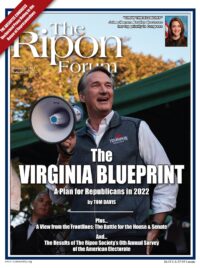
In the 2020 election cycle, no one gave House Republicans much of a chance. Google the headlines from that summer and you’ll see plenty of gloomy predictions from prognosticators about how the incumbent President’s sagging poll numbers would surely doom the House GOP to even lower depths, with predictions ranging from losing 10 to 20 seats.
Instead, House Republicans picked up a net 14 seats and didn’t lose a single incumbent, nearly flipping the majority. So what happened, and what does that tell us about the prospects for 2022?
First, Republican House candidates were able to run independent races from President Trump. There is anecdotal evidence that looking and sounding different from the President was an advantage. In an often-cited statistic, nearly every seat that was flipped from Democratic to Republican control was done so by a woman, a minority, or a veteran. The only exception was David Valadao, a moderate, bilingual, former Member intensely focused on local issues. And in Biden-won districts where incumbent Republicans also won, those Members all projected solid bipartisan credentials: Reps. Don Bacon (NE-2), John Katko (NY-24), and Brian Fitzpatrick (PA-1).
Both redistricting and the political environment are winds at Republicans’ backs at the current moment.
When Glenn Youngkin won the Virginia Governor’s race in 2021, many outside observers marveled that he was able to run a campaign that neither embraced nor shunned the former President. The truth is, at least a dozen Congressional candidates had blazed that trail in 2020, from Rep. Ashley Hinson and Rep. Mariannette Miller-Meeks in Iowa, to Rep. Mike Garcia and Rep. Michelle Steel in California. Building their own independent image without turning off Trump supporters proved a path to success for each of these candidates.
Although the campaign model deployed by Hinson and others can be a difficult line to walk, it is certainly doable and will be necessary to flip back enough seats for Republicans to regain a House majority. Look no further than the National Republican Congressional Committee’s (NRCC) early prized recruits, many of whom are women, veterans, and minorities like Jen Kiggans (VA-2), Wesley Hunt (TX-38), Monica de la Cruz (TX-15) and Esther Joy King (IL-17).
Further good news for those rooting for a new Republican Speaker is that both redistricting and the political environment are winds at Republicans’ backs at the current moment. Likewise, the first mid-term election for an incumbent almost always augers well for the minority, and history suggests that the GOP should have a good night next November.
Because of their success at the state level in 2020, Republicans control redistricting in more places than Democrats, and line-drawing efforts look to add as many as five seats net. It won’t be a bonanza of new GOP seats. Unlike past redistrictings, state line-drawers are generally reducing the number of competitive seats nationwide. In Texas, for example, we saw 10 or so competitive House districts last cycle; this cycle, we may see one or two at the most. No matter the environment, seats that are D+25 are unlikely to flip. But that also means that a majority won in 2022 may survive the decade.
Republicans need to continue their strong fundraising and develop and articulate a message that appeals to the broad middle of the electorate.
The political environment also clearly favors a GOP takeover, with both President Biden’s approval and the generic ballot numbers presaging a good election night for Republicans. At this point in 2010, Democrats were favored on the generic ballot by one point. Today, the generic average is 3.7 points in favor of Republicans. Presidential approval is historically the best predictor of Congressional election results, and today, Biden’s average is 42% approve, 52% disapprove. That’s tough sledding for Democrats in close districts.
For direct and recent evidence of the political environment, we need look no further than the gubernatorial races in New Jersey and Virginia, where Republicans did better than expected. Furthermore, the GOP candidate won nearly all of the competitive Democrat-held seats in both states, including those of Reps. Andy Kim (NJ-3), Josh Gottheimer (NJ-5), Tom Malinowski (NJ-7), Mikie Sherrill (NJ-11), Elaine Luria (VA-2), and Abigail Spanberger (VA-7). If those numbers were replicated in November 2022, the House election will be a 2010-style “thumpin.”
Everything points toward a big year for Republicans in 2022, but as we saw in 2020, sometimes the prognosticators and public polls are wrong. Candidates and elections matter. Republicans need to continue their strong fundraising and develop and articulate a message that appeals to the broad middle of the electorate. We saw in 2020 that voters will reject extremist policies like defunding the police, COVID lockdowns, limiting parental choice, and eliminating American energy. The lesson of 2021 is that maintaining a laser-like focus on the issues that matter to voters, like inflation, gas prices, and education, is a recipe for success.
The political environment will surely provide a boost, but by identifying and maintaining a meaningful message, and finding candidates who can demonstrate independence, Republicans will be in a strong position to win back the majority in the House.
Parker Poling served as the Executive Director of the National Republican Congressional Committee (NRCC) during the 2020 cycle and is currently a partner at Harbinger Strategies, a federal government affairs firm in Washington, DC.




